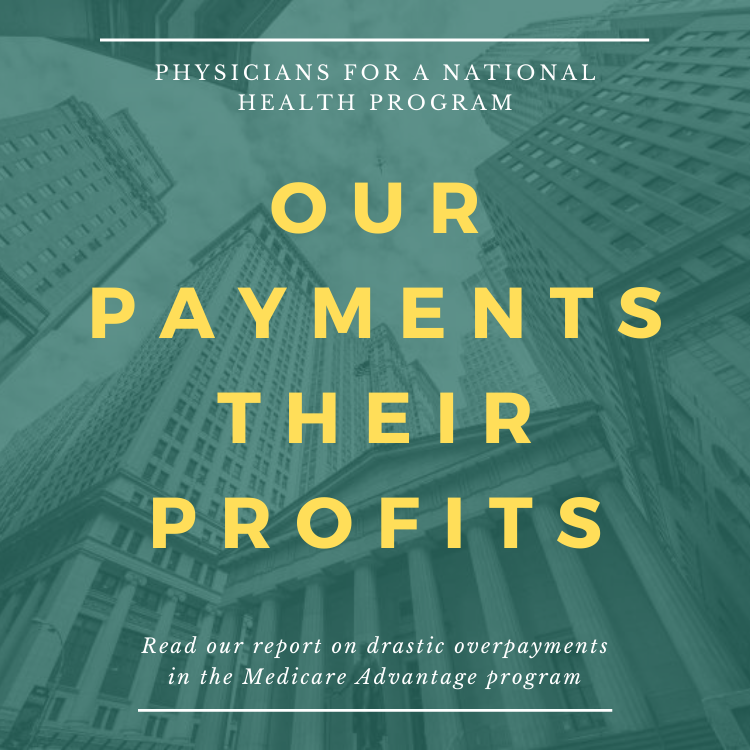By Carol Paris, M.D.
Charleston (W.V.) Gazette-Mail, April 1, 2018
During the historic West Virginia teacher strike, 22,000 workers stood up and made themselves heard, shutting down schools statewide for nine full days, before finally settling on a 5 percent raise for state employees across the board.
West Virginia and its teachers hold a special place in my heart. I graduated and completed my residency in adult psychiatry at the West Virginia University School of Medicine, and between 1983 and 1999 I raised my family in Morgantown, where my kids spent their K-12 years in public schools. The teachers there helped my children grow and thrive, and I think they deserved a 5 percent raise and more.
I want this raise for teachers so they have more money in their pockets for things like rent, food, goods and services, but a 5 percent pay increase means little in the face of skyrocketing health care costs.
That raise won’t cover the rising costs of the state’s Public Employee Insurance Agency (PEIA) plans. Teachers in the state pay for 20 percent of the PEIA funds, and as health care costs constantly rise, so is the amount coming out of their paycheck each month. Year after year, they’re essentially taking a pay cut.
Teachers are not alone. This is a problem across the country, as health care costs rise faster than overall inflation and wage growth. The costs of employer plans rose 19 percent between 2015-2017, which is slower than the cost hikes in the individual market, but far outpaces the 6 percent inflation rate and the 12 percent wage growth across those years.
Workers must shoulder more of the cost of their premiums. While companies pay a portion, their contribution only increased their payments by 1.4 percent in 2017, while employee contributions went up 8.3 percent.
If we want to get serious about controlling the rising costs of health care and addressing income inequality, Medicare for all is the clear answer. A single-payer bill like House Resolution 676, The Improved and Expanded Medicare for All Act, would improve Medicare’s benefits by covering all medically necessary care (including dental, vision and long-term care), and expanding Medicare to cover everyone, regardless of age, income or employment.
This program would save an estimated $617 billion annually by slashing administrative waste of private insurance ($504 billion) and bargaining down drug prices ($113 billion), freeing up enough money for universal coverage without any net increase in U.S. health spending.
Under Medicare for all, workers would no longer need to fight tooth-and-nail just to hang on to basic coverage, or be tied to jobs they don’t want just to keep their families insured.
Organized labor could focus on wages and working conditions instead of haggling over premiums and deductibles. Not surprisingly, several major unions have signed on to the Labor Campaign for Single Payer or passed resolutions in support for Medicare for all.
Medicare for all would also be a boon for small and mid-sized businesses, many of whom have been struggling to cover increasing premiums, and are forced to spend countless hours and headaches administering health benefits for workers. With Medicare for all, they’d be able to reinvest that money into increasing wages, hiring new employees, investing in new technologies, and more.
And with a federally funded Medicare-for-all plan, cities, counties and states would no longer need to continually raise local taxes or slash operating budgets to fund public workers’ health coverage.
The power of the West Virginia teacher strike is enough to make us think about labor battles of the past century, when organized workers won a minimum wage and the five-day work week, health and safety laws, and expanded health care benefits.
This strike demonstrates that the modern-day union still has an incredible amount of political and organizing power. Along with doctors, business owners and other advocates, together we can win the fight for Medicare for all.
Dr. Carol Paris is a psychiatrist, president of Physicians for a National Health Program, and a member of the Board of Advisors to the Business Initiative for Health Policy.
